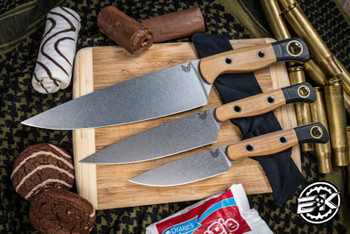5 Ways You May Be Ruining Your Utility Knives
Posted by Clayton on Apr 21st 2015
High-quality knives can last a user a very long time if they’re well-taken care of. Usually made from very resilient materials, utility knives can endure a lot of friction and use without ever having to be replaced; however, there are a few ways that these products can deteriorate over time.
If you want to invest in utility knives, but you don’t know very much about their upkeep, it’s important that you refrain from the following practices. These things will cause the knife to deteriorate quickly and give a weak performance, so keep these things in mind and avoid them when using your knives.
-
Washing Them in the Dish Washer
If there is one thing that all knife-lovers agree on, it’s that you should never put your custom utility knives in the dishwasher. The hot water and pressure are not friends to the knife, and the dish soap is too harsh for the tool.
Instead, use warm water and a mild soap to clean your tools. While this is a more tedious way to clean them, it guarantees that they don’t break down, and you’ll be able to use them for much longer. The dishwasher is only meant for regular kitchen utensils, and utility knives are not a part of this product type.
-
Letting Them Air Dry
Leaving your knives in the drying rack to dry slowly is also not a good practice for your knives, as it allows the water to soak up into the tool. Instead, after you hand wash your knives, you’ll want to hand dry them as well to remove water quickly and effectively. Allowing them to air dry makes them susceptible to rust much more quickly, so avoid this practice if you can.
-
Storing Them Unprotected
For knives that do not come with a blade protector, you will want to invest in a high-quality protector or case that fits the knife well and keeps it dry. Knives that are stored with other knives and tools unprotected will simply scratch against one another and break down over time.
It’s best if you have a specific holding area for your utility knives so that you are less prone to treat them poorly. Have the knives organized in a certain way or hung in an order so that you have a specific spot for each one where it can be stored properly.
-
Exposing it to Water of Moisture
Too much exposure to water and moisture will cause a knife to rust or break down more quickly. Just because you have a knife that is said to be made of stainless steel doesn’t necessarily mean it’s safe from the elements. If you want to make sure that the blade stays sharp and the knife stays free of rust, then avoid moisture and water as much as possible.
If you work or live near an environment like this, then make sure to protect and lubricate your knife on a frequent basis. This will help your knife to avoid the negative effects of the environment.
-
Refraining from Sharpening
If you’re not getting your knives sharpened, then there is definitely a chance that you’re going to shorten their life span. While utility knives will remain very sharp when taken care of, you will want to recognize if you haven’t been taken proper care of them. They will become dull and break down easier the longer you use them in bad conditions. Some people are well-trained in using their knives and will know how to do this themselves; however, if you’re not sure how to use a sharpening tool, then you may want to consider having it done professionally. Otherwise, you can harm the blade or make it misshaped, which is the exact opposite of what you want.
Your utility knives will not be cheap, and they’re not just for ordinary kitchen projects, either. Utility knives are meant for much tougher projects and, likewise, they require a lot more care and inspection. After every project, make sure that you do an overall check of your knives for any debris you can remove, water droplets, or things that can harm the knife if they sit in it too long.
As an added precaution, clean your knives at least once a month to make sure that they stay in top condition for use. If you aren’t using them regularly throughout the year, they may still be vulnerable to outside elements. It’s better to be safe than sorry with these products since they have the ability to last a very long time when taken care of properly.

